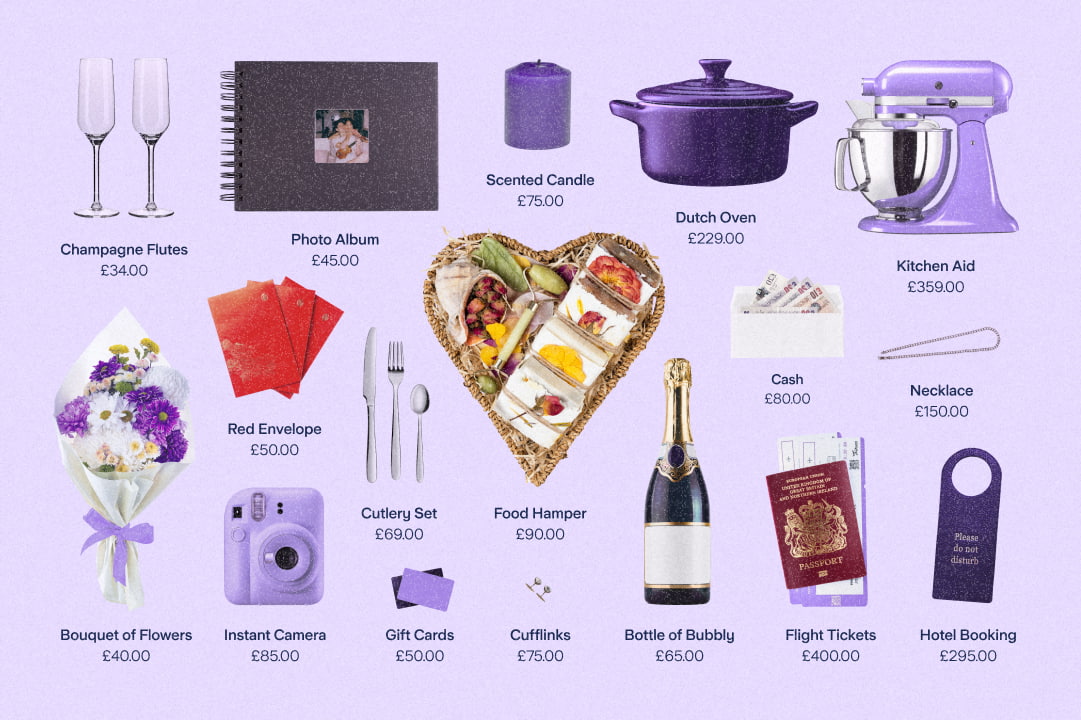
Is it crass to ask for cold, hard cash? Should we just stick to china sets? As modern couples’ priorities evolve, and the cost of tying the knot rises, wedding gift registries are changing too.
For couples getting married, costs start racking up long before they walk down the aisle. Starling’s survey of 1,001 British couples found that the average proposal costs £8,185 (including an average spend of £2,600 on the ring). The wedding itself costs the average UK couple £23,250, up 12% from 2023 to 2024. It’s also expensive for guests. Last year, attending a UK wedding cost £451 on average, including an average spend of £108 on a wedding gift. This is before you factor in stag and hen dos. Ouch.
All this means that defining a ‘proper’ or ‘appropriate’ approach to wedding gifts can be a minefield, especially for cross-cultural couples and mixed-race families – something I know first-hand. While some lovebirds treasure the sentimentality of physical gifts, others opt for honeymoon funds – or charity donations. Ahead of my wedding later this year, I want to know: are wedding registries still fit for purpose?
What is a wedding gift registry?
The original idea of a wedding gift registry is believed to have come from department store Macy’s in the 1920s. The registry allowed local couples to choose their favourite fabrics, china, and crystal patterns, and guests to shop from this list.
If a couple does a wedding registry today, they often use a specialised website with options from different brands. Some registries also allow guests to send money for a couple’s honeymoon or new home fund (which makes sense – a quarter of proposers dip into house deposit money to fund the proposal alone).
In Asia, and other places, cash gifts are what’s traditional. These come in the form of ‘red packets’ – special envelopes used to hold bank notes on occasions such as Chinese New Year. In Chinese culture, red symbolises good luck and happiness. You’ll also come across a ‘no boxed gifts’ rule for some Indian and South Asian weddings, in favour of cash contributions.
Typically, the idea of receiving banknotes in an envelope from a guest makes Brits squirm. Even a honeymoon fund makes lots of couples uncomfortable, even though a physical gift registry, where all the prices are displayed, isn’t all that different – especially as the couple can return a physical gift in exchange for cash without the gifter finding out.
Cha-ching for your supper
So why do so many British couples resist the idea of cash contributions over physical gifts? And describe it as “icky”, “uncouth” or “crass”? Well, there’s the risk that requests for cash are interpreted as couples recouping the cost of a wedding by asking guests to ‘pay their way’.
And then there’s the fact that many guests will pay a lot to be there for the couple’s big day, especially if the wedding is abroad.
For those who do opt for a honeymoon or new home fund, many seem keen to add layers of decorum around this, rather than simply sending over the details for their joint account, or a Settle Up link (for less than £250) if they bank with Starling.
Couples seem to feel more ‘polite’ when asking for money through a beautifully designed website that breaks down various elements of their honeymoon, even though this comes at a cost – platforms often charge processing fees of around 2%.



